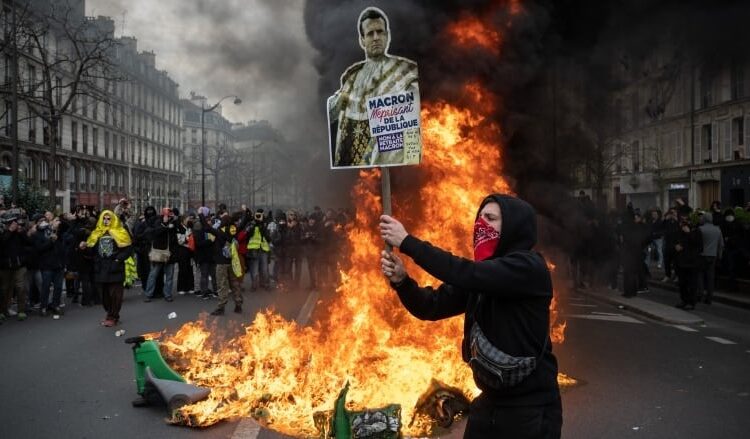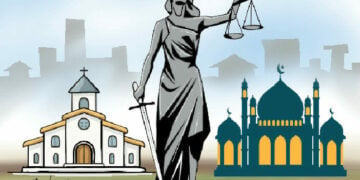In recent times, the French national football team also known as “Les Bleus” (i.e. The Blues) has been conspicuously characterized with immigrants or children of immigrants. In fact, one can mistake the team for an African team due to the colour of the players. After the elimination of Senegal in the last World Cup, many Africans ironically felt there was still one African team left in the tournament. At the 2018 FIFA World Cup, France’s African connections earned them the tag of Africa’s “sixth team.”
One will ordinarily feel that this is replete in French society, devoid of racial discrimination. Well, you are wrong for having this mindset. In light of recent racial tensions in the country reminiscent of the protests that erupted in 2020 over the killing of George Floyd in the U.S, racial discrimination and police brutality against people of colour is seemingly rife in French society. The protests that has roiled the country is clearly a result of an increase in deadly encounters with the police and long-simmering tensions between law enforcement and young people, particularly people of color.
It all began when a police officer shot and killed a teenager named Nahel Merzouk in the Paris suburb of Nanterre on Tuesday 27 June 2023. Outrage immediately boiled over and spread across France. Protests gripped big cities, as people began to call for justice. Riots have also broken out, bringing violence, fires, and hundreds of arrests. These events in France following the death of the 17-year-old shot by police draws parallels to the racial reckoning in the U.S. spurred by the killings of George Floyd and other people of color at the hands of law enforcement. Over a thousand people have been arrested and over 200 police officers injured as the government struggled to restore order.
As protesters wailed their disapproval, the chant heard repeatedly is, “Justice pour Nahel.” But while the protest center on the teenager’s tragic death, demonstrators’ demands go further. Apparently, they are trying to seize the moment as an opportunity to open a wider debate about what they see as systemic police abuse, particularly in the working-class suburbs. In France, there has long been complaints of police brutality and discrimination, especially against lower-income households and racial minorities. From the mayor to the president, authorities expressed their condolences and support for Nahel’s family, along with a pledge to hold police accountable.
Deadly shootings are less common in France than in countries such as the United States, which has a much larger population with about 1,000 fatal police shootings each year. However, this is not the first time that such is happening as deaths involving the police have previously rocked France. In 2005, 15-year-old Bouna Traoré and 17-year-old Zyed Benna, who were electrocuted after hiding from police in a power substation in Clichy-sous-Bois. This led to protests reminiscent of what is happening in France today. Floyd’s killing also helped shed light on the death Adama Traoré, whose family believes he was asphyxiated by police in 2016.
For many French citizens and keen international affairs observers, what is happening in France is really not a new phenomenon. The recent protests are a reaction not only to one instance of police violence, but also the daily stigmatization of young Black and North African men, many of whom are descended from immigrants. The teenage boy that was shot and killed by the police is of Algerian descent but born in France. His mother was quoted as saying that she blames the officer who fired the fatal shot, but not the police in general. “He saw a little, Arab-looking kid, he wanted to take his life.”
In 2017 a survey was carried in France by an independent human rights group which found 80% of young men perceived to be Black or Arab reported they were subject to identity checks within the last five years, making them 20 times more likely to be stopped by police. The U.N. Committee on the Elimination of Racial Discrimination in December last year also expressed concern about the frequent use of identity checks, discriminatory stops, the application of criminal fixed fines imposed by the police or law enforcement agencies, that they said disproportionately targets members of certain minority groups.
As the protests in France winds down, it is important for the country to seriously address the deep issues of racism and discrimination in law enforcement. In January this year, French Prime Minister Elisabeth Borne launched the National Plan Combating Racism, Antisemitism and Discrimination Linked to Origin 2023-2026. However, while this new action plan on racism is welcome, it desperately leaves huge gaps. Crucially, the plan is silent on ending well-documented systemic ethnic profiling practices by French police, including in the context of identity checks. It also doesn’t explain how to rebuild trust among minority communities who experience such attacks in the very institutions that target them, such as the police.
Sadly, in French society, people with foreign origins, or perceived as having them, are disadvantaged in terms of access to jobs or housing. They are more exposed to joblessness, poverty, poor housing, police ID checks, poor health and educational inequality. If France really wants to set out a strategy to combat racism, it needs to go deeper and look at reforming the state institutions and processes that institutionalize racial biases and discrimination in ways that harm people and their rights. The creation of a discrimination observatory to better document alleged cases, and national testing operations to uncover racial biases in employment and housing markets. Legal authorities should also make it easier to prove discrimination cases in court and ensure that penalties are genuinely dissuasive.
As Nahel Merzouk was buried with friends and family attending his private funeral at Nanterre where he was killed after being stopped by two motorcycle patrol police, a large crowd gathered outside the local mosque and followed the coffin to the cemetery, many chanting “Justice for Nahel.” While politicians sought to stop the spread of violence, Les Bleus, have made an appeal for calm. However, two of the country’s biggest police unions, have since issued inflammatory statement describing protesters as “savage hordes” and “pests.” Apparently police brutality against minorities and immigrants, racial profiling isn’t going to end anytime soon.





